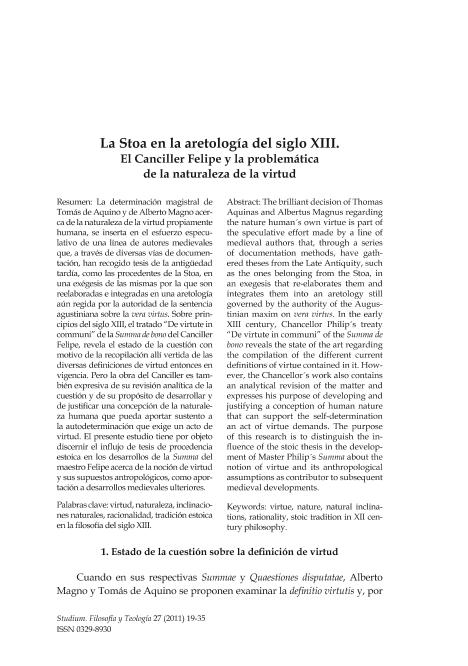Artículo
La determinación magistral de Tomás de Aquino y de Alberto Magno acerca de la naturaleza de la virtud propiamente humana, se inserta en el esfuerzo especulativo de una línea de autores medievales que, a través de diversas vías de documentación, han recogido tesis de la antigüedad tardía, como las procedentes de la Stoa, en una exégesis de las mismas por la que son reelaboradas e integradas en una aretología aún regida por la autoridad de la sentencia agustiniana sobre la vera virtus. Sobre principios del siglo XIII, el tratado “De virtute in communi” de la Summa de bono del Canciller Felipe, revela el estado de la cuestión con motivo de la recopilación allí vertida de las diversas definiciones de virtud entonces en vigencia. Pero la obra del Canciller es también expresiva de su revisión analítica de la cuestión y de su propósito de desarrollar y de justificar una concepción de la naturaleza humana que pueda aportar sustento a la autodeterminación que exige un acto de virtud. El presente estudio tiene por objeto discernir el influjo de tesis de procedencia estoica en los desarrollos de la Summa del maestro Felipe acerca de la noción de virtud y sus supuestos antropológicos, como aportación a desarrollos medievales ulteriores. The brilliant decision of Thomas Aquinas and Albertus Magnus regarding the nature human´s own virtue is part of the speculative effort made by a line of medieval authors that, through a series of documentation methods, have gathered theses from the Late Antiquity, such as the ones belonging from the Stoa, in an exegesis that re-elaborates them and integrates them into an aretology still governed by the authority of the Augustinian maxim on vera virtus. In the early XIII century, Chancellor Philip´s treaty “De virtute in communi” of the Summa de bono reveals the state of the art regarding the compilation of the different current definitions of virtue contained in it. However, the Chancellor´s work also contains an analytical revision of the matter and expresses his purpose of developing and justifying a conception of human nature that can support the self-determination an act of virtue demands. The purpose of this research is to distinguish the influence of the stoic thesis in the development of Master Philip´s Summa about the notion of virtue and its anthropological assumptions as contributor to subsequent medieval developments.
La Stoa en la aretología del siglo XIII: El Canciller Felipe y la problemática de la naturaleza de la virtud
Fecha de publicación:
06/2011
Editorial:
Universidad del Norte Santo Tomás de Aquino. Facultad de Humanidades; Centro de Estudios de la Orden de Predicadores
Revista:
Studium
ISSN:
1518-0913
Idioma:
Español
Tipo de recurso:
Artículo publicado
Clasificación temática:
Resumen
Archivos asociados
Licencia
Identificadores
Colecciones
Articulos(SEDE CENTRAL)
Articulos de SEDE CENTRAL
Articulos de SEDE CENTRAL
Citación
Corso, Laura Estela; La Stoa en la aretología del siglo XIII: El Canciller Felipe y la problemática de la naturaleza de la virtud; Universidad del Norte Santo Tomás de Aquino. Facultad de Humanidades; Centro de Estudios de la Orden de Predicadores; Studium; 27; 6-2011; 19-35
Compartir




